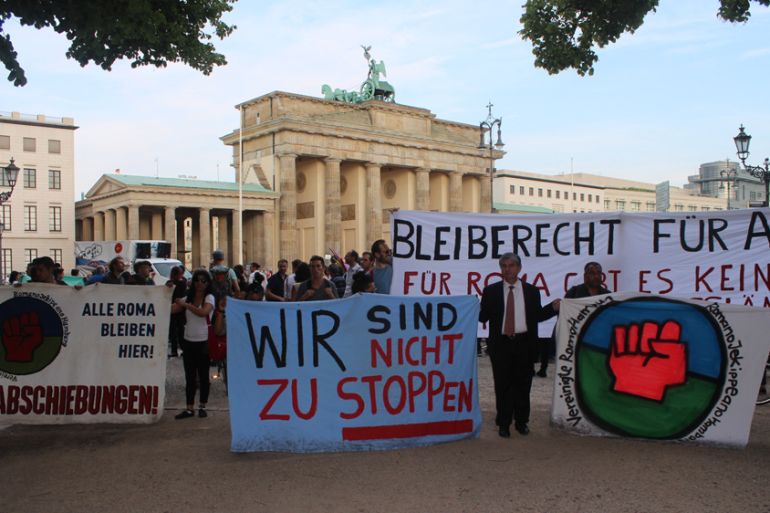Germany: Roma march against asylum-seeker crackdown
Demonstators protested against increasing deportations of West Balkan asylum applicants, many of whom are Roma.

Berlin, Germany – About a hundred demonstrators protesting against Germany’s asylum policy marched to the memorial for Roma-Sinti victims of Nazism to raise awareness of the plight of today’s Roma asylum seekers.
The protest, which took place on Friday evening, was in response to recent changes to German asylum laws and to the increasing deportations of West Balkan asylum applicants, many of whom are Roma.
Keep reading
list of 4 itemsDenmark’s tough laws on begging hit Roma women with few other options
Another Roma boy dies in police chase, marking grim pattern in Greece
‘My father didn’t beat my mother in a gypsy fashion-he just beat her’
Last October, the German government amended its asylum law by adding Bosnia and Herzegovina, Serbia, Macedonia to its list of “safe countries of origin“, legislation that makes it extremely difficult for citizens of these countries to be granted asylum.
A year earlier, in November 2014, Albania, Kosovo and Montenegro were added to the same list. Meanwhile, deportations of people from these six West Balkan countries tripled last year in comparison to 2014, and the pace of deportations has continued to intensify this year.
One of the people facing the threat of deportation is 15-year-old Victoria Zenkulovic Veselovic, a Roma who fled from Serbia to Germany in 2011 with her mother and brother. She has been going to school in Berlin and learned to speak German, but the family’s asylum application was rejected and they could be deported any day.
She joined the demonstration because she’s afraid of going back to Serbia.
|
|
| IMF says refugees could boost German economy |
“I hope I stay here because I don’t have a future in Serbia. If we go there I will face discrimination and attacks,” Veselovic told Al Jazeera. “I hope I can have a right to stay in Germany so I can finish my school and later find a job.”
Roma people face discrimination and segregation in each of the six West Balkan countries that Germany designated as “Safe Countries”, according to the most recent annual reports by Amnesty International, Human Rights Watch, and the US State Department.
The spokesman for UNHCR-Germany, Martin Rentsch, explained minorities such as Roma people could become victims of discrimination in some of the Balkan countries.
“Depending on the individual case, we think that the social, economic and cultural disadvantage of Roma people in some Western Balkan societies can be a form of persecution under the UN Refugee Convention,” Rentsch told Al Jazeera.
But throughout the European Union, the recognition rates for Western Balkan asylum applicants have remained low.
German politician under fire over racist Boateng remark
Tobias Plate, a spokesman for Germany’s Federal Ministry of the Interior, said each asylum application is reviewed individually, and every applicant has a chance to provide evidence to back up his or her claim for protected status.
“The federal government is well aware of the fact that minorities are discriminated against in Western Balkan countries,” Plate said. “However, discrimination does not necessarily mean that people are also persecuted or mistreated.”
Plate added that Germany provides protection only to people who face a level of discrimination that makes life impossible or creates such a hopeless situation that the person is forced to leave a country.
|
|
| Hundreds arrested in Germany as far-right party meets |